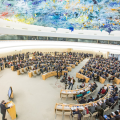Why is UK’s Middle East Policy Dependent on the US Election?

Middle Eastern foreign policy of United Kingdom has always been shaped by strategic alliances, regional conflict, and global factors. Still, the outcome of the US presidential contest is a crucial factor shaping the UK’s attitude to the region. In this editorial, we look at historical links, geopolitical reality, election cycles, and regional challenges in order to identify the underlying reasons of this reliance and its consequences.
Historical Compatibility
Among Middle Eastern common interests the US and the UK have historically shared are energy security, counterterrorism, and stability. Sometimes their close diplomatic ties lead to coordinated policies. Part of the “special relationship” between the US and the UK, foreign policy helps to create a framework within which both nations cooperate on world issues.
Beginning in the post-World War II era, the UK, understanding its reduced global importance, closely associated with the US, a newly emerging superpower. The Middle East became the principal focus of this alliance as it is geopolitally relevant and has plenty of energy sources. Cooperation in the Gulf Wars, the fight against ISIS, and diplomatic initiatives including the Iran nuclear accord reveals the depth of this link. Usually following US development of its Middle East agenda, the UK ensures a consistent Western approach on critical issues.
Geographic Reality in Geopolitical Context
The superpower in the world, the US has a lot of impact in the Middle East. Its military posture, economic might, and diplomatic reach help to define regional geopolitics. Maintaining a system of military bases and alliances in the region, the US provides security assurances to Israel and Saudi Arabia, significant allies. This presence helps the US to correctly project power and influence on local developments.
Conversely, the UK lacks the same direct impact even if it is still strong. Though considerable, American influence does not match British military and financial might. The UK so frequently relies on US leadership to negotiate challenging Middle Eastern issues. This reliance suggests that strategic interests of the UK in the region might be much affected by changes in US policy.
Cycle of elections counts
Changes in US government policies can lead to changes in foreign policy goals, therefore impacting allied nations including the UK. The UK closely monitors these developments to change its own policies, therefore ensuring that it remains in line with its most important friend. During US election seasons, uncertainty rules as possible policy changes loom huge. Depending on the posture of the US government, the machinery of foreign policy for the United Kingdom must be adaptable and ready to modify its Middle East approach.
For instance, by withdrawing from the Iran nuclear accord and later applying sanctions, the Trump government departed significantly from the approach of the former Obama government. The UK was in a delicate position trying to retain the agreement while managing its US relations, with other European nations. Similarly, changes in US posture on the Israeli-Palestinian issue or its engagement in Syria would cause the UK to adapt its policies to reflect the fresh American perspective.
Local Challenges
The UK’s position on the Iran nuclear accord is rather like US one. Should the US rejoin the accord under a different government, the UK will most likely follow suit, so strengthening diplomatic efforts to lower Iran’s nuclear ambitions. This link catches a more general tendency whereby US actions affect UK Middle Eastern policies.
Usually mirroring US policy, the UK’s approach to the Israeli-Palestinian conflict US policy shifts like shifting support for a two-state solution or reconsideration of its view on colonies influences the diplomatic efforts of the UK. Western diplomatic initiatives’ success relies on the UK’s past commitment to a negotiated settlement and its involvement in international bodies like the United Nations, which help to define its alignment with US policy.
The Part Domestic Politics Plays
Furthermore influencing Middle East policy of the UK is internal political context as well. Against overseas alliances, British officials have to balance political pressure and public opinion at home. The outcome of the US election can influence these internal dynamics since UK officials react to changes in US policy and their consequences for British interests.
Keep On Reading
A US government that accords human rights and democratic values top importance, for example, may encourage British MPs and advocacy groups supporting a more forceful stance on events like the humanitarian disaster in Yemen or Saudi Arabia’s human rights record. On the other side, a US government stressing realpolitik and strategic alliances may lead the UK to adopt a more pragmatic attitude putting security and stability over ideological concerns.
The Middle East approach of the United Kingdom remains intimately related to the outcome of the US election. As the world watches every election cycle, the UK changes its policy to balance its own objectives with transatlantic partnership. The interplay of these two pals is still determining the fate of the area; it influences diplomatic efforts as well as military operations and economic strategies.
Realizing this interconnectedness allows one to grasp the more general dynamics of Middle Eastern international relations. The UK’s approach to the area will always be defined as global power dynamics evolve and new concerns emerge by its capacity to negotiate its foreign policy in line with the US. The US-UK alliance will remain core of Middle Eastern geopolitics, deciding the path of this combustible and vital area with its strategic value and rich historical heritage.







